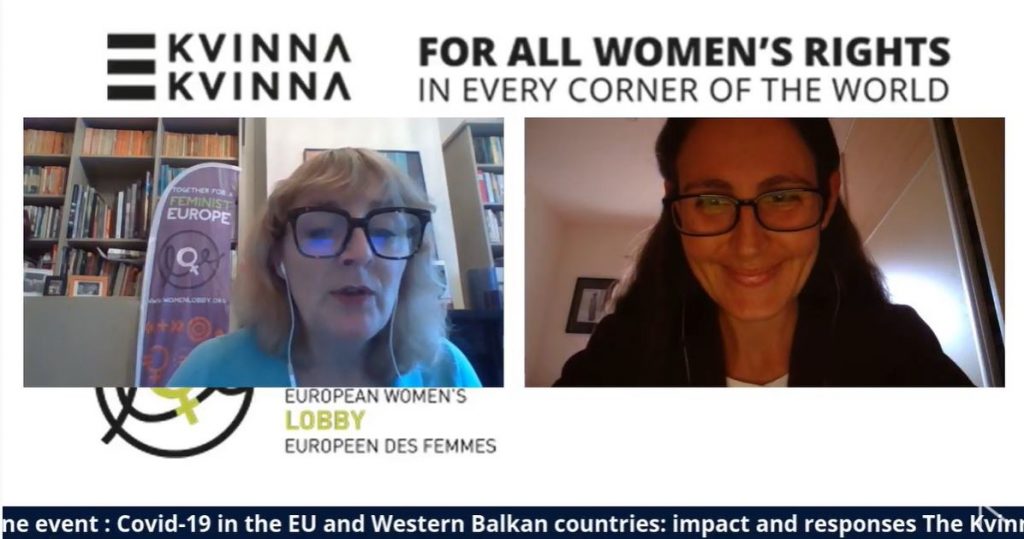The Kvinna till Kvinna Foundation and the European Women’s Lobby (EWL) on 5 November hosted an online discussion on the impact of and responses to Covid-19 in the European Union (EU) and Western Balkan (WB) countries.
Ristin Thomasson, Regional Manager Western Balkans, Kvinna till Kvinna Foundation observed that 2020 was meant to be a crucial year for gender equality globally, with the 20th anniversary of the United Nations Security Council Resolution 1325 on Women, Peace, and Security, and the EU’s adoption of the Gender Equality Strategy and upcoming Gender Action Plan III.
“However, this year, unfortunately, will be remembered more for the Covid-19 pandemic, which has caught more countries off-guard and has caused severe, economic consequences,” she said. “While the pandemic has spread in every country, COVID-19 is not an equalizer, as some have said; in fact, it has contributed to exacerbated pre-existing inequalities.”
Nicole Farnsworth, Programme Director and Lead Researcher at the Kosovo Women’s Network (KWN) was among the speakers, sharing the experiences of women’s right organisations (WCSOs). She recommended that the EU ensure that its financial support to the WB in response to the coronavirus pandemic, including the Next Generation EU and the Economic and Investment Plan for the Western Balkans, considers the often differing needs of women and men.
“Women’s rights organisations have been at the forefront in addressing the widespread gender inequalities that exist in Western Balkan countries. We could see that even before the COVID-19 pandemic women’s rights organisations were facing obstacles securing financial support. A report recently released by women’s rights organisations in the region, Where’s the Money for Women’s Rights clearly details the great financial needs of women’s rights groups.”

This report, launched by the Kvinna till Kvinna Foundation, KWN and other women’s rights organisations in September 2020, provides information about funding trends related to gender equality and financial support of WCSOs in the WB, identifying WCSOs’ needs.
Farnsworth emphasised the crucial importance of gender analysis, gender mainstreaming and the use of indicators to measure progress towards gender equality, requesting that the EU make these obligatory for all programming related to the Instrument for Pre-Accession (IPA) III, within the Neighbourhood, Development, and International Cooperation Instrument regulation and all EU external financing related to addressing Covid-19.
“Only with these we can monitor and see how women’s rights are being fulfilled,” she said.
Women’s rights organizations offered their partnership, expertise and cooperation in supporting EU efforts to ensure that the European Commission and WB governments apply a gender just and gender sensitive approach, addressing the different needs and impact of the crisis for women and men and contributing to decreasing inequalities in the region.
Other speakers at the event included: Maida Omerćehajić, Legal Adviser, Rights for All, Bosnia Herzegovina; Danilo Ćurčić, Programme Coordinator, A11 Initiative, Serbia; and Aslihan Tekin, EU Representative at the EWL Coordination for Turkey – Avrupa and Kadin Lobisi Turkiye Koordinasyonu.
Please click HERE to watch the livestreaming of this event.







